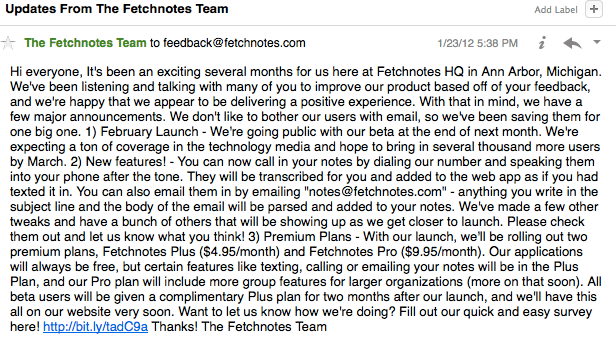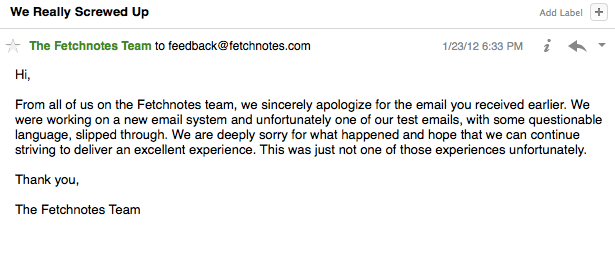Scott Weiss recently wrote a great blog post about crises he refers to as “WFIO” moments — moments where you can’t help but think, “We’re f**ked, it’s over.”
January 23, 2012 was one of those moments for my company, Fetchnotes.
Still juniors at the University of Michigan, my co-founder Chase and I had attracted a 2,000 person beta group for our product.
At the time, Fetchnotes was simply a web app that helped people keep track of notes, to-do lists, ideas, quotes, and other random thoughts, all sent in via text.
New Startup Mistakes
We sent out an email to our beta group about some big updates underway, but it ended up coming out like this:
Long story short (Chase and I still dispute whose fault this is), I didn’t know I had to use HTML to put line breaks in the email form he had built.
Strike one.
Before sending it out again, Chase wanted to make sure the HTML for the line breaks was working. I waited patiently until a few moments later I see Chase throw his hands in the air and scream, “NO! OH NO! I’m so sorry. I’m so sorry. I’m so sorry.”
“Ding!” My email client rings, and I see the subject line simply says: “Test.”
Strike two.
“Dude!” I bemoan, thinking the content was simply a benign “test.”
I opened the email to find this endearing message staring at me:
We accidentally just called 2,000 people a really bad word.
Strike three.
“WFIO” would be an apt description of how we felt.
We scrambled to send out a follow-up with the actual email, brushing it off saying, “We profusely apologize for the emails we just sent you. Notes the Dog must have gotten a hold of our email clients… We hope you will forgive us…”
But after a few minutes, we both agreed that there was no avoiding whatever wrath might come our way. We decided to just lay down on the PR train tracks, admit we screwed up, and beg for forgiveness.
In came a flurry of emails, tweets, and instant messages from our website. But to our amazement, most of them looked like this:
Lee Middleton: Stop apologising please. You made me smile.
Lori Paul: I found the email extremely comical and a well needed laugh for the day. No apology needed. 🙂
Ed Farrell: I liked it. You are building a brand that stands for something. 😉 Keep your customers in their place.
DGW: I actually find it amusing when something like that gets out. Shows that there really are people behind all those domain names.
Some people even poked fun at us back:
Todd Merritt: No problem, bitches.
Vinko Pehar: who u calling a bitch, biatch!
But the most surprising ones of all sounded like this:
[email protected]: Hey, if it wasn’t for the email I would have forgotten about your product. Now I’m reconsidering using it
Rich Hohne: another good thing…i actually forgot about fetchnotes and now I am going to give it a whirl! sometimes weird stuff works. Good luck, Alex.
All told, we received about 500 inbound messages from our 2,000 person email list.
Moreover, only two or three were actually angry or upset with us.
Engagement Increases
The craziest thing of all, however, was what happened next.
That’s a graph of engagement (notes added/edited/deleted, plus customer chats via Olark) before and after the infamous email.
As you can see, engagement spiked significantly after the email went out. Not only did the email remind people that our app existed, but the product was much better than the first time they tried it, so more people stuck around.
Crisis Communications
What can this teach us about crisis communications?
- Take Complete Responsibility for Your Crisis. Always get out in front of the situation and take responsibility. Don’t pretend it didn’t happen or try to downplay its seriousness. Own the fact that you screwed up, and take whatever heat comes your way — you did mess up, after all.
- Don’t Play the Blame Game. If you’re a small team (fewer than 10 people), it doesn’t matter who made the mistake. You’re a team, and it reflects poorly on all of you. We never said, “Blame [Chase or Alex], but please don’t blame the company.” First, it’s the right thing to do — whoever made the mistake probably feels worse than anyone else. And, people will assume it’s the entire company’s responsibility anyway. You hired these people, after all.
- Be a Real Person. The theme of most messages we received were, “I’m glad to know there are real people behind this thing. We all make mistakes.” By the end of the night, either Chase or I had personally responded to every single person that contacted us. We didn’t think anything of it, but people were floored. They don’t expect companies to be warm and authentic – they expect cold, robotic deferrals of responsibility.
Today, authenticity is something that forms the bedrock of our customer communications strategy. Every person who signs up gets a personal welcome email from me (the CEO), and tips from every other person on the team over the course of their usage.
While the emails themselves are automated, they are sent in plain text, from real email addresses, and always end with something like, “If you have any feedback, questions, or so-bad-they’re-good movies to recommend, just hit reply. It’s a real person on the other side.”
If you take anything away from this blog post, it’s this – be a real person when you communicate with your customers. Treat them with respect, and they’ll return the favor — especially when you screw up.
photo credit: Alex E. Proimos via photopin cc




